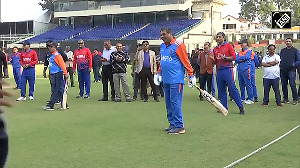The Andhra Pradesh government has launched a five-day sanitation drive to combat brain fever, which has claimed 102 lives since July 1.
According to Director of Health Dr P Rajyalakshmi, 184 cases of viral encephalitis were reported in July from nine out of the 23 districts in the state.
A team from the National Institute of Communicable Diseases that visited Karimnagar and Warangal districts in Telangana found that victims showed symptoms of Japanese encephalitis.
The nine affected districts are located in the Telangana region and in coastal Andhra.
The sanitation drive, beginning Monday, will focus on door-to-door distribution of pamphlets on sanitation and cleanliness, identification of persons suffering from fever and other viral infections, shifting them to hospitals and cleaning up of all drinking water sources, cattle sheds and other premises.
Every affected district is to receive Rs 25 lakh (Rs 2.5 million) from the government to take up the sanitation work, which includes covering open drains, clearing shrubs and drains, and undertaking fogging operations to check mosquito breeding as part of preventive measures for containing the epidemic.
Japanese encephalitis, which first occurred in India in 1955, is now a common occurrence in 24 states/union territories across the country. Andhra Pradesh is one of the severely affected states.
The first case in AP was reported in 1979 and since then cases have been reported almost every year in the last 24 years. It peaked in 1986 with 2,038 cases and 638 fatalities.
Since 1995, when the present government took office, as many as 4,237 cases were reported with 1,107 fatalities (excluding the cases that have occurred this year so far).
Widely referred to as brain fever, children in the 2-14 years age group are most vulnerable.
Culex mosquitoes and their larvae are the carriers of the disease. Almost 30 per cent of the children suffering from brain fever are likely to be afflicted with epilepsy.
The incubation period is between 5 to 15 days. Symptoms include headache, reduced consciousness and fits.
The case fatality rate (CFR) is 10 to 50 per cent and about half the survivors are left with neurological damage.
Mosquitoes breeding in rice fields transmit the virus. Pigs, horses and wild birds are the amplifier hosts. The proximity of pigs to humans increases the chance of transmission.
Annual outbreaks last four to five months during the monsoon season and peak transmission occurs in the mid-monsoon months.
In tropical areas, the risk is present throughout the year but is accentuated during the rainy season and early dry season when mosquito populations are higher.
In recent years, it has been observed that the epidemic breaks out in August-September, peaks in October-November and tapers off in December-January, but has, this year, preceded the routine precautionary measures taken by health and civic authorities.
Health authorities are yet to secure one million doses of the JE vaccine, some from the Kasauli-based Central Research Institute and the rest through imports, to take up the immunization programme in the nine vulnerable districts.
However, Rajyalakshmi claimed "the incidence of viral encephalitis has been gradually declining" over the last couple of days, 'thanks to the efforts of the Department of Health'.
The government has announced an ex-gratia payment of Rs 50,000 each to the families of children who died in the epidemic and Rs 5,000 each for the treatment of affected kids.
Chief Minister N Chandrababu Naidu has also appointed a committee to conduct a detailed analysis and suggest remedial measures to tackle cases of 'suspected' viral encephalitis.
The five-member committee, chaired by Dr C S Bhaskaran, retired vice-chancellor of NTR University of Health Sciences, is to submit its final report within 90 days.






 © 2025
© 2025